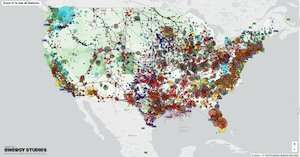US energy infrastructure mapped

A new, interactive energy map for the United States has just been released by Rice University's Baker Institute for Public Policy, providing an open-source visualization of the country's energy infrastructure and demography designed to highlight the intersection of energy, environment, policy and society.
The map, titled Energy, Environment and Policy in the U.S., displays the nation's critical energy infrastructure and environmental points of interest, as well as relevant election and demographics statistics at different levels of granularity. Users can utilize various layers and explore facility-level details with the click of a mouse.
Shih Yu (Elsie) Hung, a research manager at the Baker Institute Center for Energy Studies, and Kenneth Medlock, the James A. Baker III and Susan G. Baker Fellow in Energy and Resource Economics at the Baker Institute and senior director of the Center for Energy Studies, created the map to better understand the nexus of energy and society.
"We hope to stimulate and facilitate pertinent discussions and research with this interactive tool," wrote Hung and Medlock. "More importantly, it allows the users to effectively navigate key energy and environmental issues with a clear and complete picture of the nation's infrastructure and demography."
The map will be updated regularly to incorporate additional relevant layers and reflect the most recent data available.
More information: Map: www.bakerinstitute.org/energy- … nd-policy-in-the-us/
















